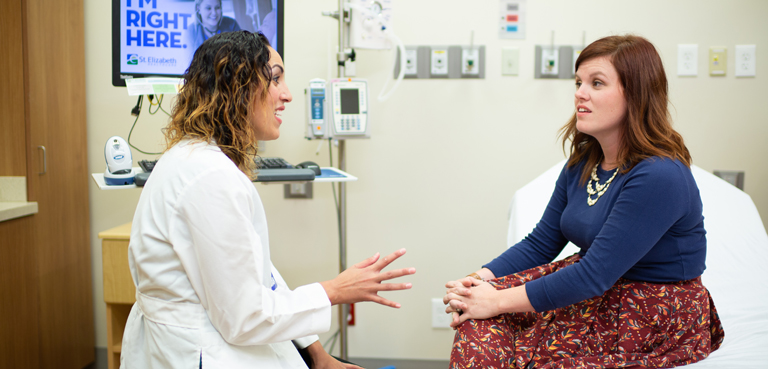Every day, Dr. Lily Hahn, an OB-GYN with St. Elizabeth Physicians, sees patients for symptoms of menopause. Many of the patients believe that because they’re having symptoms, menopause must be right around the corner. What Hahn tells them, though–and what she wishes more women knew–is that menopause symptoms can start years before menopause does.
Menopause is defined as not having a period for a full calendar year, or 12 consecutive months. Only then is a woman considered postmenopausal. But even though the symptoms often show up much earlier, that doesn’t mean a woman should have to live with them.
“If the symptoms aren’t too bothersome, we don’t have to do anything,” Hahn said. “But if they’re disrupting someone’s normal daily activities, then we can talk about things that will help.”
Here are the top three most commonly complained about menopause symptoms and treatment options available for each:
1. Hot flashes and vaginal dryness
These two symptoms often go hand in hand, and Hahn typically prescribes hormone replacement therapy or an estrogen supplement, which have been proven to help. But if a patient asks about natural remedies because she’s scared of the risks associated with hormone replacement therapy, for example, there are natural remedies, as well.
“There is no evidence the natural remedies are beneficial, but that’s because the Food and Drug Administration doesn’t do studies on vitamins or minerals,” Hahn said. “That’s the only reason why there is no actual evidence to show that they help.”
2. Low libido
In postmenopausal women, low libido becomes a “really big complaint,” Hahn said, but it’s also very hard to treat. Testosterone levels drive our libido, and, after menopause, not only does our estrogen level drop, but our testosterone level drops, too.
But, “a low libido often isn’t just a hormonal issue,” Hahn said, “it’s a psychological issue, as well, and many times you have to look at the relationship itself.”
There is a medication that combines estrogen and testosterone that can help, but Hahn only prescribes it in rare circumstances.
3. Moodiness
“So many people say they become volatile at the drop of a pin, that they’re crying at the smallest thing or going off on their husbands and children,” Hahn said. “When they say, ‘This isn’t me,’ I know it’s time to try something.”
Anti-depressants are effective for treating moodiness, and they’re also effective for treating hot flashes, she said. “Sometimes, you can treat multiple symptoms with one medication.
Remember: If you’re able to deal with symptoms of menopause, that’s fine, but if the symptoms are affecting your daily life, there’s no need to suffer at home.
“Come in and let’s talk about your options,” Hahn said.

